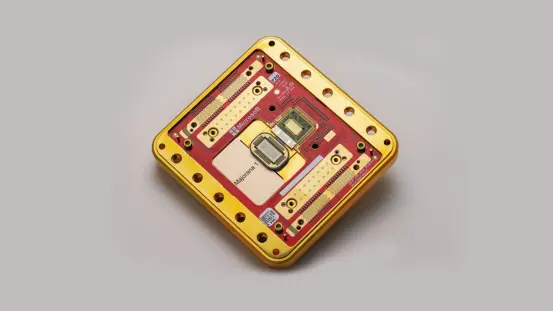Can Microsoft leverage future growth with its newly developed quantum computing chip?
19:59 March 15, 2025 EDT
The field of quantum computing received a big news. Microsoft announced the launch of its first quantum computing chip, Majorana 1. Microsoft said that Majorana 1 is mature enough to serve as the basis for future quantum computers.
But at present, Microsoft has not seen a significant rise in share price due to the good news about quantum computing chips. The market's attitude towards the stock is relatively cautious and calm.
It is reported that Microsoft may not develop quantum computing as an independent main business at present, but as a key technology to assist and promote other businesses, forming synergies with existing businesses . In January 2025, Microsoft published a blog post stating: "2025 is the year when quantum computing will be ready." This greatly ignited the enthusiasm of the market and pushed the stock price further up.
In the next few years, when Microsoft's quantum computing chip completes the transformation from technology to commercialization, can Microsoft create a new growth curve and drive its stock price to rise strongly?
Quantum computing is coming
Before introducing Majorana 1 , it is necessary to understand the background of quantum computing. The core of quantum computers is quantum bits (qubits), which are the units of information in quantum computing, similar to the binary used in today's computers. The problem is that quantum bits are quite fragile and are easily disturbed by environmental noise. These disturbances may cause calculation errors or data loss. This makes the current development of quantum computing relatively slow.
To solve this problem, Majorana 1 adopts a new solution by creating the so-called "world's first topological body" to observe and control Majorana particles, thereby producing more reliable and scalable quantum bits. It is reported that Microsoft has successfully placed 8 topological quantum bits on a chip, and through the design, the quantum bits can be controlled digitally, redefining and greatly simplifying the way quantum computing works.

Image source: Microsoft official website
For Microsoft, IBM, Google and other companies that are developing quantum computers, their ultimate goal is to accommodate 1 million quantum bits on a chip of controllable size, commonly known as a universal fault-tolerant quantum computer. Its computing power has increased exponentially, and it can handle large-scale and complex problems that are difficult for traditional computers to achieve.
Microsoft said that with scalable quantum computers, we will be able to predict materials with better properties, thereby building the next generation of quantum computers that exceed the current scale. At the same time, quantum computing will also unleash the potential of AI. Quantum computing can provide AI models with the ability to generate massive data. Developers can describe target molecules or materials in natural language, and quantum computers will quickly generate optimization solutions, greatly shortening the R&D cycle.
However, Majorana 1 is not open to customers. Currently, Majorana 1 is mainly used for research and experiments, and Microsoft plans to further explore its potential through cooperation with national laboratories and universities. It is expected that Microsoft will provide quantum computing capabilities through Azure cloud services before 2030.
Although the current focus is on research, investors are still full of expectations for quantum computing . After the news was released, the capital market responded enthusiastically, and most of the US stocks of quantum computing concept stocks rose, SEALSQ rose 11.92%, D-Wave Quantum rose 8.28%, Quantum rose 7.86%, and Rigetti rose 4.85%. It is worth mentioning that Rigetti's stock price rose by nearly 1,500% in 2024. This once again proves that the market is optimistic about the long-term prospects of the field of quantum computing.
Although IBM and Google are leading in the superconducting quantum bit path, Microsoft's topological quantum bits have greater potential in error rate control. If the goal of one million quantum bits is achieved, it may reshape industry standards. Microsoft's ultimate goal is to apply quantum computing to fields such as chemistry, materials science, and drug development, and to achieve large-scale commercialization in "a few years rather than decades."
The BCG report "Long-Term Forecast for Quantum Computing Still Looks Bright" predicts that by 2040, quantum computing will create $450 billion to $850 billion in economic value and bring a market of $90 billion to $170 billion to hardware and software suppliers. With the gradual implementation of Majorana 1, Microsoft is expected to reap rich rewards from this huge market in the next few years.
Expanding the boundaries of AI business
As a leading global technology giant, Microsoft's business covers many fields including operating systems, productivity software, enterprise solutions, games, cloud computing, AI, etc. "Cloud" and "AI" are its two core businesses.
As the world's second largest cloud service provider, Azure is the main driver of Microsoft's growth. Azure not only provides computing, storage and network resources for enterprises, but also promotes the application of technologies such as AI, IoT and big data. With the acceleration of global digital transformation, enterprises' demand for cloud computing continues to rise. It is expected that by 2030, the size of the cloud computing market will grow from US$496 billion in 2023 to US$2 trillion, with a compound annual growth rate of 22%. By then, Azure AI may help Microsoft seize more market share and become its core growth engine for the next decade.
In terms of AI, Microsoft's investment in AI continues to increase, especially in generative AI, natural language processing and big data analysis. The most eye-catching is the cooperation with OpenAI. Microsoft has provided OpenAI with huge financial and computing power support, and embedded its AI technology into multiple core products, greatly enhancing its competitiveness in the field of AI.
It is worth noting that on the day of the launch of Majorana 1 , Microsoft also launched the generative AI tool Muse for the first time. Muse is based on the World and Human Action Model (WHAM), based on the WHAM-1.6B version architecture, and uses deep learning algorithms and image generation technology. Developers can interact with Muse through the Xbox controller to generate content corresponding to the character control, providing a flexible and personalized creation experience.
Muse solves the long-standing challenge of making AI understand three-dimensional space interactions. It can generate coherent game sequences up to two minutes long, effectively maintaining the stability of physical laws and character behaviors. Microsoft said that Muse can achieve "practical understanding" and grasp how objects, characters, and environments interact over time in three-dimensional space. This will further expand the application boundaries of AI in the field of game development and directly enhance the competitiveness of the Xbox ecosystem.
At present, Microsoft has built a closed-loop ecosystem of "cloud services + AI applications + hardware infrastructure" and continues to bet on the AI field. Microsoft said it plans to invest approximately $80 billion in fiscal 2025 to develop data centers to train AI models and deploy AI and cloud-based applications. Microsoft's annualized revenue from AI business now exceeds $13 billion, a year-on-year increase of 175%. The technical potential of quantum computing may give rise to a new "quantum + AI" business model, bringing long-term technological dividends to Microsoft.
Technical aspects
Currently, the market is generally optimistic about Microsoft's long-term prospects . According to TipRanks statistics , 32 Wall Street analysts have provided Microsoft with a 12-month price target in the past three months , with an average target price of $510.38 , and most analysts have given Microsoft a "buy" rating.
Truist Securities analyst Joel Fishbein reiterated his "buy" rating and $600.00 price target on Microsoft on January 28. Joel Fishbein said Microsoft benefited from a stable spending environment in the cloud computing sector and is accelerating the adoption of artificial intelligence services. This growth is reflected in Microsoft's 16.4% revenue growth in the past 12 months.
Joel Fishbein also said Microsoft is expected to exceed expectations in most enterprise categories. Cloud services, AI services and Copilot are among the areas where Microsoft is expected to perform particularly well.
Conclusion
Overall, Microsoft's value lies not only in the steady growth of its existing business, but also in the exponential returns that can be achieved from its bet on disruptive technologies .
In the future, as the commercialization of quantum computing accelerates, Microsoft is expected to achieve dual breakthroughs in technology and business. For the industry, this technological wave will promote the deep integration of quantum computing with other industries such as AI , and start a new round of technological revolution.
Disclaimer: The content of this article does not constitute a recommendation or investment advice for any financial products.

Email Subscription
Subscribe to our email service to receive the latest updates
